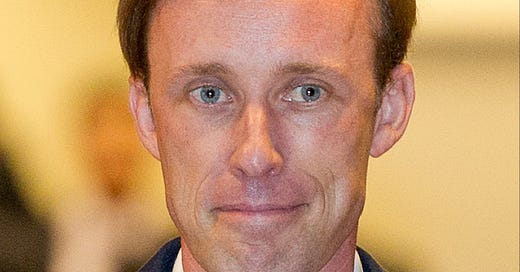Jake Sullivan, now the White House National Security Adviser, desribes “The Loop of imperfection” in U.S. policy making over the decades.
The minute you walk into the White House Situation Room, you immediately recognize that you have a collection of imperfect people with imperfect information about what is going on, facing imperfect choices and in an imperfect process where it is actually hard to draw in the right people to contribute to the decision. It shouldn’t come as any surprise you end up getting imperfect results. Every solution you propose or pursue inevitably creates almost necessarily new problems. So even when you think you have done the right thing, you have generated a whole new set of additional decisions that put you right back into this loop of imperfection.”
—Jake Sullivan, in the opening of the final installment of the BBC documentary series The Corridors of Power
Jake Sullivan’s soliloquy in The Corridors of Power summarizes more succinctly and more persuasively than anything else I have read how “the Best and the Brightest” messed up so tragically in the era of America’s war in Vietnam.
I was sent a link to the eight-part series by a producer as I finished posting on Substack my own eighteen-part series LBJ and McNamara: The Vietnam Partnership Destined to Fail (to be released as a book in November). The BBC series’ portrayal of U.S. decision making in Iraq, the Balkans, Rwanda, Kosovo, Darfur, Libya, Afghanistan, and Syria illustrates with powerful documentation the recurring pattern that defined what went so wrong in Vietnam — the reality of “this loop of imperfection.”
The series was broadcast on the BBC last spring, and I’m told that a two-hour version will appear on PBS soon. The full series had been scheduled to air on Showtime, but the network has cancelled all of its documentaries. The producers apparently have not found a new U.S. distributor. (Welcome to the commodification of content in our age.)
The series, brilliantly directed by Dror Moreh, must have been filmed some time ago since a number of the most prominent people interviewed have died: Henry Kissinger, Colin Powell, Madeleine Albright, Sandy Berger.
Jake Sullivan and Samantha Power, who wrote “A Problem from Hell”: America and the Age of Genocide and has served in senior positions in the Obama and Biden administrations, are exceptionally eloquent in framing the portrait of mishaps that have become timeless.
The decades since the end of the Cold War have been notable because of crises that were marked by massacres or characterized as genocides, when one national or ethnic group sets out to destroy another. The 2022 Russian invasion of Ukraine (and the enduring military conflict that followed) was different because it was a restoration of traditional warfare in which one country seeks territorial control of another.
It would be misleading to characterize the U.S. response to all these challenges in the same way, but there is a thread that the series makes indelible: hesitation, confusion, policy reversals, and a failure to understand how to deploy what the United Nations calls the Responsibility to Protect, “a global political commitment to prevent genocide, war crimes, ethnic cleansing and crimes against humanity,” adopted by the General Assembly in 2005.
In every case, the president, who is the ultimate decision maker, is influenced by domestic political calculations or a shortfall in developing alliances with friends and partners to share the risks and costs of action. Another factor, which was so relevant in Vietnam, is ignorance of the countries in question — their history, culture, or language.
For example, in the aftermath of what became known as the Arab Spring, which in 2011 had led to regional upheaval and regime change (leaving matters in most respects worse off than they were), the Obama administration intervened in Libya, advocating for the downfall of the eccentric leader Muammar Gaddafi, who was assassinated in a coup.
In 2012, a coordinated attack by an Islamic militant group on two U.S. government facilities in the Libyan city of Benghazi, leading to the deaths of Ambassador Christopher Stevens and Foreign Service Officer Sean Smith, became so politicized in Washington that the real issues in play were lost and never recovered. Republicans in Congress went after President Obama, Secretary of State Hillary Clinton, and National Security Adviser Susan Rice in relentless investigations that obscured whatever had happened so thoroughly that any further action to restore order in Libya was meaningless. The civil war in Libya continues to this day.
As I watched the Libya installment, in particular, I recognized the elements of mistakes, confusion, and political constraints that were so present in my account of President Lyndon Johnson and Secretary of Defense Robert McNamara in the 1960s, both of whom recognized that they were pursuing an essentially hopeless outcome yet felt compelled not to change course.
In the crises of recent decades, American military casualties have been much lower than they were in Vietnam, but civilians in vast numbers — millions — have suffered and died.
Jake Sullivan is right about the “loop of imperfection” in policy making. The deeper and probably immutable reason for mayhem is the human race’s capacity for devastating violence and destruction.






